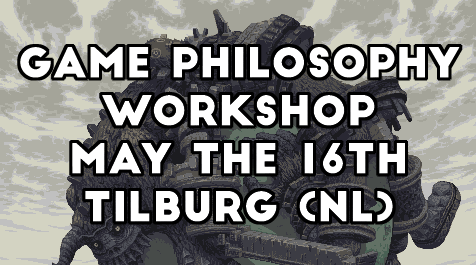
May 4, 2023
Philosophy workshop on video games


Workshop on Video Games 16 May 2023
********************************
Videogames are undoubtedly one of the most significant developments in the modern popular arts. Moreover, as a burgeoning artistic medium, they raise a number of striking aesthetic, metaphysical, and phenomenological questions, especially concerning ontology, imagination, and fictionality.
The goal of this workshop is to provide a forum for philosophers and games studies scholars to engage with each other through the sharing of cutting-edge, work-in-progress material. In so doing, we hope to facilitate/explore possibilities for future collaborations.
Program
16 May 2023 LOCATION TBA
| 12:15-12:30 | Welcome & “Coffee” | |
| 12:30-13:30 | Alex Fisher | Self-involving imagination |
| 13:45-14:45 | Nathan Wildman | Are we playing the same game? MAIFs and the algorithmic account of videogame identity conditions |
| 15:15-15:45 | Stefano Gualeni | On conceptual games |
| 16:00-16:30 | Nele van de Mosselaer | Perceptual discrepancies in gameworlds |
| 16:30 | Drinks :) |
Registration & Accessibility
- Attendance is free and drop-in visitors are welcome! If you’d like to register beforehand, email Nathan Wildman (n.w.wildmanATtilburguniversity.edu) with ‘VG Ad-Hoc Shop Registration’ as the subject.
Talk Abstracts
- Alex Fisher – Self-involving imagination. This paper considers the ethical significance of self-involving imagination, where we imagine about ourselves. This form of imagination occurs in various contexts, such as in simulation of others’ mental states, and when we imagine ourselves to be a character in acting and in our engagement with videogames and other interactive fictions. The ethical concern is that the imaginer might be morally corrupted as troubling attitudes they take on in imagination leak into their actual psychology. This worry is heightened in interactive contexts such as acting and videogames as the imagined immoral attitudes play a significant role in motivating action, hence more plausibly might start to influence us outside of the imaginative context. I note two mechanisms which serve to prevent leakage of immoral attitudes, dampening this ethical concern. First, we often face heightened imaginative resistance to taking on immoral mental states in a way we do not in non-self-involving imaginative contexts. This prevents us even imagining holding some immoral attitudes. Second, whilst generally we passively quarantine our attitudes to the imaginative context, in morally charged cases we also more actively quarantine – we take on immoral attitudes in imagination but are consciously careful not to acquire them in reality. I argue that this pair of guarding mechanisms help prevent our becoming morally corrupted through self-involving imagination, and more generally underlie much of our engagement with art containing immoral perspectives.
- Nathan Wildman – Are we playing the same game? What are the identity and persistence conditions for video games? That is, what, if any variation in rules/gameplay can a game survive and still be the same game? A number of philosophers (see e.g. Juul 2005, Lopes 2010, & Tavinor 2011) have defended an algorithmic answer to this question, with perhaps the most developed account being that of Moser (2018). Here, I raise some problems for these algorithmic accounts. Specifically, I first argue for the existence of Modifiable-Algorithm Interactive Fictions (MAIFs) – i.e., games where playing involves the changing/modifying of the games’ fundamental algorithms. Examples of MAIFs include Hack ‘n’ Slash (Double Fine 2014), Baba is you (Hempuli, 2019), and, arguably, ZZT (Potomic Computer Systems, 1991). I then go on to contend that algorithmic accounts of videogame identity cannot make sense of the existence of MAIFs. The upshot is that such accounts are not the full story when it comes to videogame identity.
- Stefano Gualeni – On conceptual games. Like conceptual works of art, some games are designed to convey intellectually significant ideas in ways that are not exclusively linguistic. Drawing from art theory, we argue that the kinds of ideas one can experience practically and first-hand through ‘conceptual games’ can be of three kinds: socio-political, philosophical, or self-reflexive. Conceptual games that take a self-reflexive stance in particular communicate knowledge about games themselves, about their expressive conventions and their relationships to players’ expectations. While the quality of being self-reflexive does not by itself grant a game the status of a theoretical contribution to game studies, there are self-reflexive games that explicitly address theories and texts in the field. Among the few existing examples of self-reflexive games that were deliberately developed as scholarly contributions to game studies, Doors (the game) (Gualeni & Van de Mosselaer 2021) is discussed and analyzed as a particularly relevant case study.
- Nele van de Mosselaer – Perceptual discrepancies in gameworlds. Imagine an in-game avatar hiding behind a wall with their head pointed downwards. Their apparent field of vision merely includes the ground in front of them. The player controlling this avatar from a third-person perspective, however, can peek behind the wall, see the enemies that are there, and adjust to the situation accordingly. This in-game situation exemplifies a discrepancy in avatar and player perceptions of the gameworld. Drawing from a Waltonian framework, I will identify three kinds of perception that are involved in digital gameplay and discuss how they can interestingly misalign: (1) Fictional perceptions, or what the characters within the gameworld, including the avatar, are represented as perceiving; (2) Players’ actual perceptions from their perspective as external observers of the gameworld; and (3) Imaginative perceptions, or what players imaginatively perceive when taking on the role of participants in the gameworld, as so-called “virtual subjects” (cf. Gualeni & Vella 2020). I will argue how perceptual discrepancies are not only valuable expressive devices, but also of theoretical interest when it comes to investigating perception and imagination in virtual environments.

